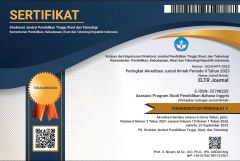ARTIFICIAL INTELLIGENCE USAGE IN HIGHER EDUCATION: EFL STUDENTS’ VIEW
Abstrak terlihat: 760 / PDF terunduh: 403DOI:
https://doi.org/10.37147/eltr.v8i2.198Keywords:
AI, higher education, student perceiveAbstract
This research aims to determine students' perceptions and challenges faced using AI due to the gaps faced by EFL students. This research uses a qualitative method which uses two data collection techniques, namely observation as supporting data and interviews with 6 students from different classes as main data. To analyze the data, researchers used thematic analysis and then used content validity to support the research. The results of this research show that the majority of students agree that the use of AI in EFL classes is very helpful in the independent learning process and improves speaking, reading, writing, and giving ideas. So the researchers concluded that based on students' perceptions, these perceptions had a positive impact on the use of AI in EFL classes. Researchers hope that students and lecturers can use AI according to the role of AI. Researchers also hope that this research can become a reference for readers.
Downloads
References
Aljohani, R. A. (2021). Teachers and students’ perceptions on the impact of artificial intelligence on English language learning in Saudi Arabia. Journal of Applied Linguistics and Language Research, 8(1), 36–47.
An, X., Chai, C. S., Li, Y., Zhou, Y., Shen, X., Zheng, C., & Chen, M. (2023). Modeling English teachers’ behavioral intention to use artificial intelligence in middle schools. Education and Information Technologies, 28(5), 5187–5208. https://doi.org/10.1007/s10639-022-11286-z.
Arai, M., Tejima, K., Yamada, Y., Miura, T., Yamashita, K., Kado, C., Shimizu, R., Tatsumi, M., Yanai, N., & Hanaoka, G. (2024). REN-A.I.: A video game for ai security education leveraging episodic memory. IEEE Access, 12, 47359–47372. https://doi.org/10.1109/ACCESS.2024.3377699.
Cheng, C. T., Chen, C. C., Fu, C. Y., Chaou, C. H., Wu, Y. T., Hsu, C. P., Chang, C. C., Chung, I. F., Hsieh, C. H., Hsieh, M. J., & Liao, C. H. (2020). Artificial intelligence-based education assists medical students’ interpretation of hip fractures. Insights into Imaging, 11(1), 119. https://doi.org/10.1186/s13244-020-00932-0.
Creswell, J. W., & Creswell, J. D. (2018). Research design: Qualitative, quantitative, and mixed methods approaches. Thousand Oaks: Sage.
Dawadi, S. (2020). Thematic analysis approach: A step-by-step guide for ELT research practitioners. Journal of NELTA, 25(1–2), 62–71. https://doi.org/10.3126/nelta.v25i1-2.49731.
Grimm, N., Meyer, M., & Volkmann, L. (2015). Teaching English. Tübingen: Narr Francke Attempto Verlag.
Jain, K., & Raghuram, J. N. V. (2024). Unlocking potential: The impact of AI on education technology. Multidisciplinary Reviews, 7(3), 2024049. https://doi.org/10.31893/multirev.2024049
Jeon, Y., Jin, S., Shih, P. C., & Han, K. (2021). Fashion: An AI-driven creativity support tool for facilitating ideation in fashion design. Proceedings of Conference on Human Factors in Computing Systems, 1-18. https://doi.org/10.1145/3411764.3445093.
Kim, H. S., Cha, Y., & Kim, N. Y. (2021). Effects of AI chatbots on EFL students’ communication skills. Korean Journal of English Language and Linguistics, 21, 712–734. https://doi.org/10.15738/kjell.21..202108.712.
Kim, N. J., & Kim, M. K. (2022). Teacher’s perceptions of using an artificial intelligence-based educational tool for scientific writing. Frontiers in Education, 7, 1–13. https://doi.org/10.3389/feduc.2022.755914.
Knox, J. (2020). Artificial intelligence and education in China. Learning, Media and Technology, 45(3), 298–311. https://doi.org/10.1080/17439884.2020.1754236
Merkl-Davies, D.M., & Brennan, B. (2018). The Irish Journal of Psychology, 1(1), 25–34.
Moybeka, A. M. S., Syariatin, N., Tatipang, D. P., Mushthoza, D. A., Dewi, N. P. J. L., & Tineh, S. (2023). Artificial intelligence and English classroom: The implications of AI toward EFL students’ motivation. Edumaspul: Jurnal Pendidikan, 7(2), 2444–2454. https://doi.org/10.33487/edumaspul.v7i2.6669.
Persson, V., & Nouri, J. (2018). A systematic review of second language learning with mobile technologies. International Journal of Emerging Technologies in Learning, 13(2), 188–210. https://doi.org/10.3991/ijet.v13i02.8094.
Roebianto, A., Savitri, S. I., Aulia, I., Suciyana, A., & Mubarokah, L. (2023). Content validity: Definition and procedure of content validation in psychological research. TPM - Testing, Psychometrics, Methodology in Applied Psychology, 30(1), 5–18. https://doi.org/10.4473/TPM30.1.1.
Seo, K., Tang, J., Roll, I., Fels, S., & Yoon, D. (2021). The impact of artificial intelligence on learner–instructor interaction in online learning. International Journal of Educational Technology in Higher Education, 18(1), 54. https://doi.org/10.1186/s41239-021-00292-9.
Stranges, M. K. W., Ul Haq, S., & Dunn, D. G. (2014). Black-out test versus UV camera for corona inspection of HV motor stator endwindings. IEEE Transactions on Industry Applications, 50(5), 3135–3140. https://doi.org/10.1109/TIA.2014.2306979.
Sumakul, D. T. Y. G., Hamied, F. A., & Sukyadi, D. (2022). Artificial intelligence in EFL classrooms: Friend or foe? LEARN Journal: Language Education and Acquisition Research Network, 15(1), 232–256.
Tseng, H., Yi, X., & Yeh, H. T. (2019). Learning-related soft skills among online business students in higher education: Grade level and managerial role differences in self-regulation, motivation, and social skill. In Computers in Human Behavior, 95, 179-186. https://doi.org/10.1016/j.chb.2018.11.035.
Walkington, C., & Bernacki, M. L. (2020). Appraising research on personalized learning: Definitions, theoretical alignment, advancements, and future directions. Journal of Research on Technology in Education, 52(3), 235–252. https://doi.org/10.1080/15391523.2020.1747757.
Wang, Y., & Stockwell, G. (2023). Social justice and technology in second language education. Iranian Journal of Language Teaching Research, 12(1), 1–18.
Downloads
Published
How to Cite
Issue
Section
License
Copyright (c) 2024 Sesilia Yuliani, Tefanya Laili Mukhibbah, Eliasanti Agustina

This work is licensed under a Creative Commons Attribution-ShareAlike 4.0 International License.











 ELTR Journal,
ELTR Journal, 